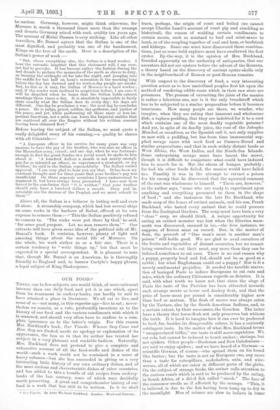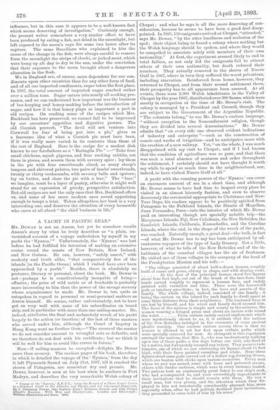OUR FOOD.*
THERE can be few subjects, one would think, of more universal interest than our daily food, and yet it is one which, apart from its treatment in cookery-books, can hardly be said to have attained a place in literature. We all eat to live, and some of us—not many, in this superior age—live to eat ; never- theless we remain, as a rule, profoundly incurious as to the history of our food and the various condiments with which it is seasoned, and should very often have to confess to a com- plete ignorance as to the latter's origin. For this reason Mrs. Buckland's book, Our Viands : Whence they Come and How they are Cooked, needs no apology or explanation of its appearance, the less so in that its author has treated her subject in a very Pleasant and readable fashion. Naturally, Mrs. Buckland does not pretend to give a complete and exhaustive account of all the food-stuffs and dishes of the world—such a work could not be contained in a score of heavy volumes—but she has succeeded in giving us a very interesting little history of our own ordinary dishes, and of the most curious and characteristic dishes of other countries, and has added to this a bundle of old recipes from cookery- books of the last century, some of which were decidedly worth preserving. A great and comprehensive history of our food is a work that has still to be written. In it we shall * OUT Viands. By Anno Wa'bank Buokland. London : Ward and Downey. learn, perhaps, the origin of roast and boiled (we cannot accept Charles Lamb's account of roast pig and crackling as historical), the reason of wedding certain condiments to certain meats, such as mustard to beef and mint-sauce to lamb, or of the coupling together of veal and ham, or beefsteak and kidneys. Some one must have discovered these combina- tions, just as some bold explorer must have swallowed the first oyster. By-the-way, it is the opinion of Mrs. Buckland, founded apparently on the authority of antiquaries, that our ancestors did not eat oysters before the advent of the Romans, a theory based on the discovery of ancient oyster-shells only in the neighbourhood of Roman or post-Roman remains.
With respect to the discovery of food, a very interesting question arises as to how uncivilised peoples first hit upon the method of rendering edible roots which in their raw state are poisonous. The process of extracting the juice of the manioc is rather a laborious one, nor is it the only breadstuff which has to be subjected to a similar preparation before it becomes innocuous. How many people are there, we wonder, who imagine, when they are eating that innocent and wholesome dish, a tapioca-pudding, that they are indebted for it to a root which contains one of the most deadly vegetable poisons P And yet, in spite of its deadly juice, the root of the Jatropha Manihot, or mandioca, as the Spanish call it, not only supplies us now with a pudding, but has from time immemorial sup- plied savage races with such food as Cassava-Bread and similar preparations ; and that in such widely distant lands as West Africa, the West Indies, and the South-Sea Islands. Some enterprising savage must have learnt the secret, though it is difficult to conjecture what could have induced him to search for it. Not the stress of hanger, probably ; for had his other foods failed, the manioc would have failed too. Possibly it was in the attempt to extract a poison for his enemy that he discovered that the squeezed remnant of the root was wholesome to himself. " There are, however," as the author says, " some who are ready to experiment upon anything and everything presented to them in the shape of food ; " and she instances the late Dr. Buckland, who made soup of the bones of extinct animals, and his son, Frank Buckland, who tasted every animal that he could procure from the Zoological Gardens. The soup must have been a very " clear " soup, we should think. A unique opportunity for eating an extinct monster was lost when the Siberian mam- moth was discovered, encased in ice,—the first instance, we suppose, of frozen meat on record. But, in the matter of flesh, the proverb of " One man's meat is another man's poison" still holds good. We are glad to avail ourselves of the fruits and vegetables of distant countries, but we cannot bring ourselves to eat their meat, any more than they can be induced sometimes to eat ours. There is no real reason why a puppy, properly bred and fed, should not be as good as a rabbit ; but what Englishman could eat a puppy P Nor is it a merely sentimental prejudice. It needed the terrible starva- tion of besieged Paris to induce Europeans to eat rats and mice, which the ordinary Chinaman regards as dainties. It is said, with what truth we know not, that since the siege of Paris the taste of the Parisian has been attracted towards such strange meats as horse and donkey flesh, and that the price of horse-meat per pound is considerably higher now than beef or mutton. The flesh of mares was always eaten by the Tartars, also by the South-American Indians, and, to a certain extent, by their successors, the Gauchos. The latter have a theory that horse-flesh not only preserves but whitens the teeth. It is bard to imagine how it can ever be preferred to beef, for, besides its disagreeable colour, it has a curiously astringent taste. In the matter of what Mrs. Buckland terms " unappreciated trifles," our taste is still more capricious. We eat eels, but cannot be induced to touch snakes ; shrimps, but not spiders. Other people—Bushmen and New Caledonians— are said to enjoy spiders ; and we have heard of a German—a scientific German, of course—who spread them on his bread like butter; but the taste is not an European one, any more than a taste for caterpillars, cockchafers, ants, and wire- worms, all of which are eaten in different parts of the globe. On the subject of strange foods, the author calls attention to the curious result which is said to be produced by the eating, in South Africa, of a dried fish called " snook." The face of the consumer swells as if affected by the mumps. "This, it is believed, is due to the fish having been hung up to dry in the moonlight. Men of science are slow to believe in lunar influence, but in this case it appears to be a well-known fact which seems deserving of investigation." Curiously enough, the present writer remembers a very similar effect to have been produced by eating a fish, not dried in the moonlight, but left exposed to the moon's rays for some two hours after its capture. The same Brazilians who explained to him the cause of the change in the fish, were always careful to remove from the moonlight the strips of ch,arki, or jerked meat, which were hung up all day to dry in the sun, under the conviction that their exposure to the moon brought about a dangerous alteration in the flesh.
We in England are, of course, more dependent for our con- diments upon other countries than for any other form of food, and of all our imported condiments, sugar takes the first place. In 1887, the total amount of imported sugar reached rather over a million tons. Sugar enters into nearly all cooking pro- cesses, and we can understand how important was the business of bee-keeping and honey-making before the introduction of sugar, and how it is that honey plays so important a part in old recipes. On reading some of the recipes which Mrs. Buckland has here preserved, we cannot fail to be impressed by our ancestors' appetites and digestive powers. The old Cornish proverb, "The devil will not venture into Cornwall for fear of being put into a pie," gives us a fearsome idea of what a Cornish pie must have been, if it was really more varied in its contents than those of the rest of England. Here is the recipe for a modest dish known to our forefathers as a "Battaglia Pie " :—" Take four small chickens, squab pigeons, and four sucking rabbits, cut them in pieces, and season them with savoury spice ; lay them in the pie with four sweetbreads sliced, as many sheep's tongues and shivered palates, two pairs of lambs' sweetbreads, twenty or thirty cockscombs, with savoury balls and oysters; lay on butter, and close the pie with a leer." The " lear," we imagine, must be a layer of pastry, otherwise it might well stand for an expression of greedy, prospective satisfaction. But old recipes are not the only ones that Mrs. Buckland offers us, and some of her more modern ones sound appetising enough to tempt a trial. Taken altogether, her book is a very interesting one, and deserves the attention of every housewife who cares at all about "tee chief business in life."



















































 Previous page
Previous page